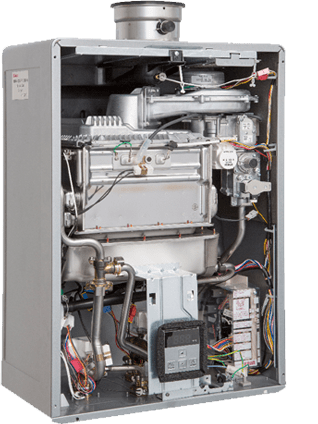domestic Services
The Ultimate boiler guide
Our expert Home Advisor can help you choose the right boiler for your home and family
Our expert Home Advisor can help you choose the right boiler for your home and family

Our expert Home Advisor can help you choose the right boiler for your home and family
Are you ready for winter? In the UK, we know the importance of making sure your home is ready for the extreme wind, snow, ice and sub-zero temperatures our winters can bring.
Staying comfortable during the cold months starts with having the right heating solution for your home that runs smoothly and efficiently all season long. Whether you are considering upgrading your heating equipment, need a repair, or are looking for ways to help save on energy this winter, this guide will help to answer your questions and provide you with the information needed to make smart and informed decisions about your heating equipment.
Take the Guesswork out of Your Connected Home Setup with Pace A trusted leader in the home service industry, we make easy to keep your home comfortable, with the latest Smart Home systems. including the Google Nest Thermostat, Nest Hello and more.
Take the Guesswork out of Your Connected Home Setup with Pace A trusted leader in the home service industry, we make easy to keep your home comfortable, with the latest Smart Home systems. including the Google Nest Thermostat, Nest Hello and more.
Pace Heating & Plumbing is dedicated to bringing peace of mind to you year-round. All our engineers are gas safe registered. Call 0207-183-2727 if you are not ready to talk now fill out your contact information and a dedicated Home Advisor and Business Account Managers will work with you to customize a solution for your business or home and family needs
The process of finding the right boiler for your home can often feel like an overwhelming task. There are a variety of options to consider and, depending on the needs of your home, there are different features available to customize your boiler for optimal comfort.
To help you navigate through this complex buying decision, below are some details about the 3 main boiler options and various answers to common questions about home heating.



If you are looking to have a new boiler installed, there are different options and features available to customize heating solutions according to your needs. We will review different types of boiler, available features, options and how a boiler works.
To tailor a solution to your home, we recommend having a Pace Home Advisor assess your needs and recommend what is best for you and your home. Learn more about booking an expert in-home consultation here.
Our guide covers the three most common types of boiler and central heating options; system boilers, conventional boilers and combi boilers. The type of boiler you need will depend on the size and age of your property as well as your lifestyle.
 A combi boiler, also known as a combination boiler, is highly efficient and compact, making them ideal for smaller homes. The name combi refers to the fact that these boilers are able to act as both a water heater and also a central heating unit.
A combi boiler, also known as a combination boiler, is highly efficient and compact, making them ideal for smaller homes. The name combi refers to the fact that these boilers are able to act as both a water heater and also a central heating unit.
Thanks to their space saving features, combi boilers are one of the most popular choices in the UK – accounting for over half of domestic boiler installations each year.
Combi boilers work by heating water directly from the mains, so you don’t need a hot water storage cylinder or cold water tank. While combi boilers have some great advantages, there are also considerations you should make before going ahead with an installation.
 Also known as a regular boiler, a conventional boiler system comprises several parts, including a boiler, heating controls, a hot water cylinder, a cold water storage cistern, and a feed and expansion cistern. A conventional boiler system is fed by two tanks which are located in the loft. The boiler heats water which is circulated through pipes. This is used to heat water stored in a hot water cylinder until it is needed or to heats the water, which is circulated through radiators to heat your home
Also known as a regular boiler, a conventional boiler system comprises several parts, including a boiler, heating controls, a hot water cylinder, a cold water storage cistern, and a feed and expansion cistern. A conventional boiler system is fed by two tanks which are located in the loft. The boiler heats water which is circulated through pipes. This is used to heat water stored in a hot water cylinder until it is needed or to heats the water, which is circulated through radiators to heat your home
 A system boiler works similarly to a conventional boiler, except that it does not require a feed tank or expansion vessel to be kept in the attic as this technology is built into the boiler unit itself. It takes its cold water supply directly from the mains, heats it up and sends it to a hot water cylinder to be stored until it is needed.
A system boiler works similarly to a conventional boiler, except that it does not require a feed tank or expansion vessel to be kept in the attic as this technology is built into the boiler unit itself. It takes its cold water supply directly from the mains, heats it up and sends it to a hot water cylinder to be stored until it is needed.
You can use multiple taps at once The storage tank means that you can get hot water from multiple sources like taps and showers at the same time without losing water pressure or seeing a temperature drop.
Delivers stronger water pressure A system boiler takes cold water directly from the mains which means it usually delivers a stronger water pressure than a conventional boiler (assuming water pressure is adequate in your area).
Compatible with solar thermal System boilers can work with a solar thermal system, which uses the sun’s energy to heat water for your home. This can reduce your household’s carbon emissions and energy bills.
Not as compact as a combi boiler Unlike a combi boiler, a system boiler requires a hot water storage tank, making it far less compact.
Hot water tank heat loss Any hot water created will be kept in a hot water storage tank until it’s needed. During this time heat will be lost, so it’s important to try and prevent as much of this heat loss as possible by insulating it.
You are limited by the size of your hot water tank With a system boiler you can only use as much hot water as your storage tank can hold. If you require more you must then wait for your boiler to heat it again, and this is usually on a set timer.
When you are selecting a new boiler check to see if it is ErP Rated to make sure you are getting an energy efficient option.
When researching types of boilers, you are likely to come across the terms condensing and non-condensing boilers. These terms describe the type of technology within the boiler, i.e. how the boiler uses fuel to produce heat for your home.
You will not have to make a choice between these types as, by law, all modern boilers now use condensing technology as standard. This is because they are more energy efficient than non-condensing boilers. While non-condensing boilers would only be able to extract between 50-80% of heat from the fuel, modern condensing boilers can typically extract 90-92% of the heat.
Condensing boilers are so much more effective because they are sealed systems meaning they extract heat from flue gases which would have otherwise been lost by a non-condensing boiler. Condensing boilers were not overly popular when they first hit the market, with early teething problems and a collection of myths about their reliability putting many homeowners off. Since then condensing boilers have come a long way and many of those old issues have been resolved.
The ErP Rating is a requirement set by the European Union which is designed to drive improvements in the efficiency and performance of heating and hot water products. The ErP rating introduces new efficiency classes from A++ to G which are displayed on a labels which come with the boiler. ErP labels are already a common sight on washing machines, televisions and other appliances within electrical retailers.
A boiler installed in a garage or loft is at higher risk of freezing than a unit installed in a kitchen or utility room. Boilers have water within them that is susceptible to freezing in cold conditions and if this happens the boiler is likely to breakdown. To combat this, modern boilers have a frost protection feature that sees the boiler turn on if the temperature of the water drops to a certain level, heating it up until the risk of freezing has been prevented.
Having an efficient heating system running on a low carbon fuel is one of the most important steps you can take to reduce your fuel bills and your carbon dioxide emissions.
Back to top
If you live within the M25, the type of fuel your boiler will use will be restricted to gas or, electricity but some homeowners may find they have a choice.
Gas is the most common heating fuel type in the UK and the majority of homeowners who are connected to the gas grid opt for a gas boiler.
Cheaper to run than electric boilers: Gas is around 3-4 times cheaper than electricity per kWh making it a much more economical option when it comes to heating your home. Whilst a gas boiler is not 100% efficient (and an electric radiator is), you can still get more heat for your money from gas.
Gas is the cleanest fossil fuel: Whilst gas is a fossil fuel and therefore not environmentally friendly, it is the cleanest fossil fuel of those available. In fact, gas creates less than half of the CO2 emissions of oil, and a third of those produced by coal.
You must be connected to the gas grid: In order to power a boiler with natural gas you must be connected to the gas network. It can be extremely costly to have your property connected to the grid if it is not already, so if this is the case you may want to opt for a different fuel type.
An electric central heating boiler is a great option for anyone looking for a compact boiler for a smaller household. They are also a good alternative for homes that cannot install a gas boiler since they are not connected to a gas line.
A typical electric boiler will work by heating the water that runs through it with a heating element and this hot water is then pumped to where it is needed. Thanks to the way they heat water, electric boilers are considered one of the least wasteful options as there is extremely minimal heat loss like there is with a gas boiler.
High efficiency: An electric boiler can run at around 99% efficiency as it doesn’t lose heat in the same way as a gas boiler would. Whilst this does mean that the boiler itself is more efficient, it doesn’t necessarily make an electric boiler eco-friendly.
Simple, compact and often cheaper to install: Electric boilers use fairly simple technology when compared to a gas boiler. For this reason they are usually compact and in many cases cheaper to install than other boiler types, especially as there is no flue to be fitted. Since they don’t use gas, there isn’t the same risk present from carbon monoxide and you don’t need to use a Gas Safe Registered installer.
High cost of electricity: Despite being so efficient, electric boilers can be expensive to run due to the high cost of electricity. With gas costing less than half of the price of electricity, you should consider this factor before opting for an electric boiler.
Not always ideal for large properties: An electric boiler can only heat small amounts of water at a time, and usually they cannot store it for later use. This means a larger property which uses a lot of hot water, or has multiple bathrooms being used at once may not find an electric boiler adequate.
Reliance on electricity: Since this style of boiler runs on electricity, it might not be the best option for a property that is affected by power cuts or outages on a regular basis.
Pace Heating & Plumbing is home to heating experts who have helped thousands of London homeowners searching for advice and guidance. If you’ve got heating questions, we’ll have the answers.
Back to top
Heating accounts for about 53% of what you spend in a year on energy bills, so an efficient boiler makes a big difference. All well-maintained boilers burn their fuel very efficiently, but they inevitably lose some heat in the hot gases that escape up the flue (a pipe for extracting fumes and supplying fresh air to the boiler).
Modern boilers are more efficient for several reasons, but their main advantage is that they are all condensing boilers. A condensing boiler has a larger heat exchanger, so it recovers more heat, sends cooler gases up the flue and is more efficient. Sometimes the flue gases get so cool that the water vapour in the gas condenses out, and even more energy is recovered from the condensing vapour.
In a typical gas central heating boiler there are pipes entering the boiler underneath. One is the pipe which feeds gas from the mains gas supply (which is outside your home in the street) into the boiler. Another pipe enables cold water to enter the boiler so it can be heated and another enables hot water to exit the boiler so it can be pumped around your home.
Beyond selecting the right boiler type for you and your family, there are several other things to consider to ensure your unit is the right choice for your home and budget. Here is some information about boiler options, installation and accessories.
Make sure to have your new boiler professionally sized by a Gas Safe Registered Engineer. A properly sized system will run more efficiently than an incorrectly sized unit.
Back to top
One of the most important decisions when upgrading your heating equipment is choosing whether to repair your old or replace it with a new system. Before making the decision, you will want to determine the equipment you are having installed, the total cost of ownership and the cost and effort of maintenance.
Your boiler plays and essential role in keeping your home warm as well as running your hotwater and central heating radiator in the winter. When it comes time to replace your boiler, consider upgrading your radiator and hotwater tank at the same time to help ensure you are getting the most out of your investment.
Energy Efficiency
Anytime you upgrade outdated equipment you could be investing in a more efficient system. Replacing your boiler, hotwater tank and central heating radiators at the same time will help you maximize your energy savings.
Equipment performance
Since your boiler, hotwater tank and central heating radiators work together, replacing just one piece could prevent the newer piece of equipment from reaching its potential performance.
Potential savings
Boiler, hotwater tank and central heating radiators are often sold together as packages, so if you decide to upgrade at the same time there may be deals or discounts available. Having all pieces of equipment installed at the same time may also result in cheaper labour and installation costs.
A like-for-like boiler replacement is the most straightforward boiler installation and can be completed within one day.
Back to top
Even if you are a handy person, installing something as complex as a new home heating is not a good idea. A gas safe registered professional engineer brings experience and updated knowledge of gas code requirements, modern electronics and new technologies. Unless you are a certified gas safe registered engineer, a self-installed boiler could lead to a poorly operating, unsafe system.
Depending on the system that you are having installed, a boiler installation can take anywhere from a half-day to three day to be properly installed. This includes the installation, testing and clean up.
Most boiler installations will be done by two professionally trained gas safe registered engineers. A good installation team will come on time and prepared with all the parts necessary to get the job done. The engineers should also be wearing booties over their shoes to protect your home, rolling out additional carpet and floor protection where needed.
The boiler installation itself can take a few hours and once it has been installed, the team will fire it up and conduct tests to make sure it is working properly and in sync with your other systems. Then they clean up completely, removing the old boiler, all parts and packaging.
Before the installation, you should ensure the room where old boiler is installed and any other work areas are clean, clutter-free and well lit. For everyone’s safety, keep children and pets away from the work area.
Once your new boiler has been installed, the heating engineer will take you through how to use the controls. Taking the time to hear about the features of the boiler will help you to use your new heating system efficiently. Before leaving the heating engineer will provide you with a Building Regulations Compliance certificate which confirms the unit has been installed safely.
With the installation complete, it’s time to register the installation with the manufacturer to validate the warranty. Most manufacturers request that this happens within 30 days of installation.
There’s no right or wrong time to have your boiler serviced – as long as it’s being serviced once every 12 months. While you can have your boiler serviced at any time of year, we highly recommend arranging one during the summer.
Back to top
To keep your warranty valid you will need to have your boiler serviced annually. A boiler service involves a heating engineer inspecting the boiler inside and out, checking the flue pipe, ensuring that the gas pressure is correct and how the boiler performs during operation.
Not only will an annual boiler service keep your warranty valid, they will also ensure that your boiler is performing safely and to its full potential in terms of efficiency and reliability. Plus, it could bring a potential issue to the attention of a heating engineer before it turns into a fault and you need to pay for a repair.
Annual boiler services ensure that your boiler is able to heat your home for as many years as possible. As boiler technology has developed, the warranty length offered by some manufacturers have extended. In some cases, you can get a warranty of up to 12 years so you wouldn’t need to consider a boiler replacement until after that warranty has come to an end.
Manual thermostats are economical and simple to control but the temperature in your home will only be adjusted when you manually change the settings of the thermostat.
Pros:
Cons:
Programmable thermostats can help save on heating costs by adjusting the temperature inside of your home automatically throughout the day. These thermostats are very easy to operate and can be set to meet your changing needs – such for a work week vs. weekend.
Pros:
Cons:
One of the newer trends in smart home technology are smart thermostats that you can control from your computer or smartphone. These thermostats learn, remember and adjust to how, when and where you use your system. They can help you to save on your energy consumption by adjusting the temperature only when it knows you need it.
Pros
Cons:
Beyond being able to control your home’s heating from your smartphone, communicating Wi-Fi thermostats can also communicate directly with your boiler. This feature means your thermostat can receive warnings and error codes from your boiler and ensure everything stays running smoothly. They also allow the equipment to operate at its peak efficiency and to modulate its output.
Pros:
Cons:
Heating accounts for about 53% of what you spend in a year on energy bills, so an energy efficient boiler makes a big difference. reduce your fuel bills and cut your household carbon footprint
Back to top
Over time, debris and rust can build up in the pipes of your central heating system. This can lead to a range of issues, from making your heating system less efficient to causing boiler breakdowns. To help prevent these problems from arising, you might be considering using magnetic filters in your central heating system.
But what exactly are these filters, how do they work and could they be a good choice for you? Keep reading to discover the answers to these questions and more.
As water passes through the metal pipes and radiators in your central heating system, rust can form. This rust can then break off and, when combined with other debris and dirt, it can create a mud-like substance often referred to as sludge. This sludge travels through your central heating system and can start to settle in certain places, leading to a range of potential problems.
For example, when it builds up at the bottom of radiators, it can cause cold spots, meaning your heating won’t function as efficiently as it should. The substance can also start to clog up components within your boiler, such as the pump or heat exchanger. This could result in breakdowns and mean you need to have parts of the appliance replaced.
Magnetic filters are designed to catch this sludge and therefore prevent these problems. The fact that they are magnetic means they effectively attract and remove the corroded iron and steel material within the sludge.
For example, if your radiators tend to stay cool at the bottom but get hot at the top, this could be a warning sign of a sludge build-up.
Having to bleed your radiators regularly to ensure they get hot at the top is another giveaway. Your boiler making strange gurgling or banging noises can also point to a sludge problem, as can pump leaks or failures. When parts are removed from your boiler, check them to see if they are full of dirt. If they are, this shows that there is sludge in the system.
If you don’t tackle this problem, your heating system will become less and less efficient, meaning you end up paying more in energy bills. You also run the risk of needing potentially expensive boiler repairs, and the lifespan of this appliance may be reduced. Your boiler warranty could be affected too.
Just like other parts of your heating setup, a magnetic filter must be maintained in order to carry on working properly. Pace heating engineer will remove and clean this filter during our annul boiler service. Keeping up with this maintenance will mean your magnetic filter continues to help protect your boiler and central heating system from a build-up of sludge well into the future.
If you’d like further information or advice on this topic, or on any other issue relating to a your boiler, don’t hesitate to contact the Pace Home Advisor.
Are you ready for the heating season? A UK winter can come in a flash, and you want to make sure that you and your home are ready for the cold before the temperature drops. Just like you don’t wait for your car to stop running before you change the oil, you should not wait for your boiler to break down before you have it inspected. Especially as your boiler ages, some parts become worn or dirty over time such as pilot lights, fans, pumps, and the burner assembly. You want to make sure that your boiler is maintained regularly to help avoid a costly breakdown during the winter.
Why should I have my boiler maintained?
Can I inspect the boiler myself?
By all means, check and change your boiler pressure, but unless you are a qualified Gas Safe Registered engineer, it is not safe to attempt to fully inspect your own boiler.
What should I do before the boiler inspection?
Before the engineer arrives, help ensure safety for everyone by clearing the area your boiler is in and the path to the equipment of any clutter or other items. Replace bulbs to ensure adequate lighting. For everyone’s safety, separate and keep your children and pets away from the work area.
When you are doing maintenance around your home, be sure to replace the batteries and test both your fire alarm and carbon monoxide detector. This should be done at least twice a year.
Back to top
There’s never a good time to need a boiler repair. Whether it’s a one-off boiler repair or emergency boiler repair, it is important not to leave it if your boiler requires repair. Depending on the problem you are facing, ignoring the issue will leave you cold this winter and further damage the equipment. For most problems, it is best to call a gas safe registered engineer to come and inspect and repair the system to ensure it is fixed properly.
For more information about having your boiler fixed, here are a few frequently asked questions for the most common boiler issues:
Emergency boiler repair
Not all boiler faults are considered an emergency. If your boiler repair falls into any of the following categories then it’s considered an emergency boiler repair:
The Pace gas safe registered heating engineers can respond to emergency boiler repairs within 24 hours.
Do not try to open or repair a boiler. Unless you are a qualified heating engineer, never attempt to remove the door or open the boiler in any way. Electronics and anything inside your boiler are for professionals only.
Back to top
If your boiler develops a fault but you are not a member of the Pace Home Protection Plan you will need what’s known as a one off boiler repair click here to schedule to heating engineer visit.
The cost of one off boiler repairs can vary considerably. It could be based on the time the engineer takes to repair your broken boiler. In this case an engineer will usually estimate the time that will be needed and the cost of the job, but this could increase if unexpected complications arise.
Alternatively, Pace Heating & Plumbing offer a fixed price boiler repair. This is also known as fixed fee boiler repair and means the price you’re quoted won’t change, even if the job takes longer than initially planned. Parts and labour are included in this price so there are no surprises down the road.
Some boiler repairs are much more common than others. And a couple of them are safe enough for you to resolve yourself. However, this only includes repairs such as increasing boiler pressure and bleeding radiators. A heating engineer should always be hired to carry out more serious repairs.
No one wants to break the bank trying to keep their home warm and comfortable during the cold winter months. Do you know how to heat your home to a comfortable temperature and keep bills low
Heating controls are there to make sure you stay in control of your heating and what you pay. It’s very tempting to turn the dial to 27°C and hope for the best at this time of year, but this will also trigger a massive energy bill.
Take a look at our tips below to find out how you can take control of your heating.
Smart thermostats could be your next green choice to help reduce your carbon footprint and energy bill
Smart thermostats could be your next green choice to help reduce your carbon footprint and energy bill
Back to top
Room thermostat; This type of thermostat prevents your heating system from using more fuel than it needs to. It will turn the heating on until the room reaches the temperature you have set and then off until the temperature drops below your programmed temperature.
Thermostatic radiator valves; These allow you to control the temperature of your individual radiators, allowing you to turn down the heat in rooms you are not using. Set them to the level you want for the room; a lower setting uses less energy and so will save you money.
Boiler thermostat; Your boiler should have a dial or a digital temperature setting. This sets the temperature of the water that is pumped from the boiler through the radiators to heat your home. Turn it up during cold winter spells to make sure you don’t get cold.
Programmer or time control; Once you have set a programmer or time control based on your regular daily routine, it will automatically switch your heating off when you’re not at home, or when you can do without the heating being on.
Setting your time control; You should set the central heating programme to come on around half an hour before you get up, and go off around half an hour before you go to bed. And if the house is empty during the day, or you can manage without heating during the day, make sure you’ve set the programmer to go off for this period too.
Boiler service; This is recommended every year and will help maintain the performance of the heating system. If the heating system isn’t performing effectively then it would be worth remembering about the boiler service as part of the annual safety check. If your boiler needs replacing, we have advice to you buy a new, energy-efficient model.
Smart heating controls; Smart thermostats are the newest type of heating control that connect to the internet, allowing them to be accessed and adjusted remotely. They can give you much greater control over your heating, from wherever you are, at any time of day.


Boiler repairs could cost over £600. You could avoid most unexpected repair costs like these with our Pace boiler Protection Plans.

We’re Pace Heating & Plumbing If you’re looking for boiler engineers in your area, then you’ve come to the right place. All our engineers are trusted & accredited Gas Safe registered professionals. We only higher the best. Get in touch today!